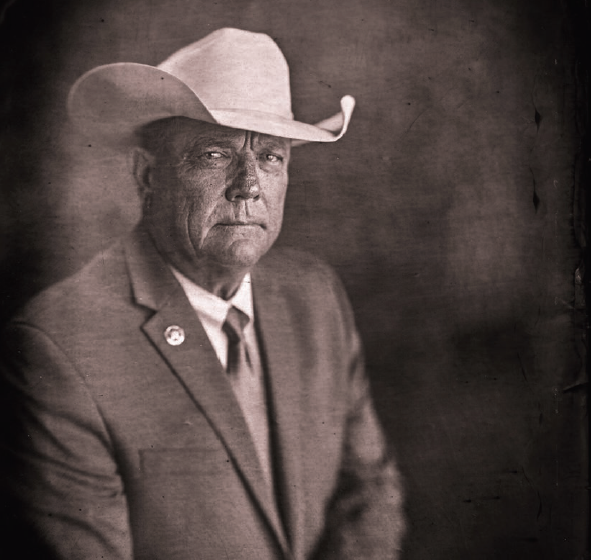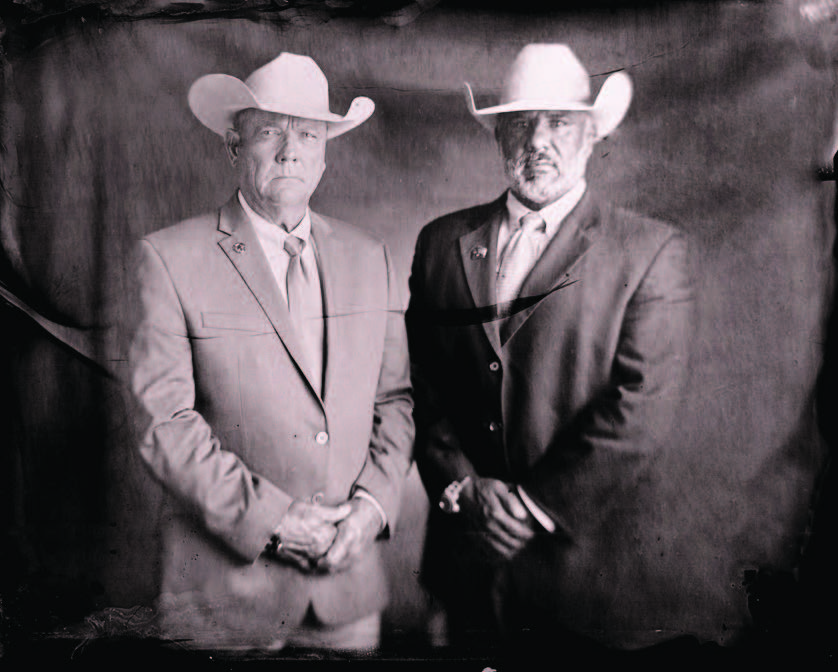Leadership Lessons From a Texas Ranger

Former Texas Rangers chief Hank Whitman on his transition from law enforcement to head of the Texas Department of Family and Protective Services.
In his long career, Hank Whitman not only spent eleven years with the Texas Rangers, rising to become chief of the agency. He also, most recently, held what he describes as an even tougher job: overseeing the Texas Department of Family and Protective Services. When Whitman retired from DFPS last June, Governor Greg Abbott recognized his service, saying he’d “helped create a safer future for Texas.” We spoke with Whitman about his time as a Ranger, the leadership challenges he encountered at DFPS, and the fulfillment of his role in, as he describes it, protecting the unprotected.
Did you know when you were small that you wanted to be a Texas Ranger? No, I didn’t. I’ll tell you that I didn’t have a real long career with the Texas Rangers. I only did 11 years. I don’t think anybody’s ever made it to chief that quick, but things happen quickly within our division. I was a police officer in Corpus Christi for ten years before I came to DPS, where I was later promoted into the Criminal Intelligence Division. I completed my graduate degree and was promoted into the Rangers in 2001.
Before the governor asked me to be the commissioner of the Texas Department of Family and Protective Services, I thought being the chief of the Texas Rangers would be the pinnacle of my career. But this whole new family [DFPS] that I took on for the last three years really captured my heart.
It’s two different worlds. The Rangers are completely apolitical. They do a lot of public corruption work and investigate mostly high felony crimes. Public corruption cases are a huge part of their daily work and are often referred to the Rangers by a district attorney or a law enforcement agency head. Those cases are sensitive and sometimes controversial and, understandably, should not be investigated by the local law enforcement agency. On any given month, we’re also working 40 to 60 homicides around the state. But this latest job [with DFPS], I went from overseeing a $22 million Ranger budget and a $20 million border budget to an almost $3 billion budget. A large increase in personnel too. DFPS has 12,250 employees while the Rangers now have 150. There really aren’t that many Rangers. When I came on to the Rangers, there were a little over 100.
Wow. That’s not many for a big state like Texas. That is true! But I had to learn how to deal with politics in the new job at DFPS. Something that I didn’t have to do in my previous position. Lawmakers would either be hugging each other from both sides of the aisle or arguing. It was tough and that is a big understatement. I met with lawmakers on a regular basis. A lot of them were fantastic to work with. Many I consider personal friends. Obviously, I didn’t see eye to eye with all of them, and likewise they didn’t with me at times. But I don’t think I left that capitol with any enemies. We all respected each other. They too have a very tough job.
It was difficult to see our caseworkers get pounded on a daily basis, when they’re doing the best job they can with very limited resources and funding. If a legislator would start yelling at me in a hearing, I would think, “Well, I’m going to yell back too. I may be an appointed commissioner but I’m a citizen of this state too.” Fortunately, I had nothing to lose—I didn’t apply for the job. So, I thought, “Well, I’m going to yell back. Fire me! I don’t care. I’ll go home right now.”
I was mindful of not crossing the line too far and knew I had to maintain a professional demeanor for my employees. It wasn’t about me. It was about them and to this day, I say they have the hardest, most thankless job in government service. I’m proud to have been their leader for those three years. They have saved so many children and
elderly people from abuse, neglect, and exploitation.
What were some of the first challenges you faced when you took on the commissioner job at DFPS? One of the things I asked the governor was, “Will you allow me to build my own executive team?” He said, “Absolutely.” There was no influence from above. There was no “Hey, you need to do this or that or consider this person or that person.” We were allowed to develop sound policy that was proven, develop an effective, dedicated executive team, and challenge the status quo.
The generals underneath the executives were a different challenge. About half of them were engaged, and the other half were like, “We’ve seen cowboys ride in here, but eventually they ride off into the sunset. We’ll watch this guy ride off into the sunset like the rest.” That attitude did not sit good with me at all.
When I called all the field leaders in for a face-to-face meeting, I could tell which ones despised me even being there. And I understand that. Here’s a guy coming into their world who doesn’t even have an inkling of knowledge about child welfare or adult protection services. I respected that wholeheartedly. I’m not a caseworker. I’m not a social worker. I was a cop and I didn’t want them to think I was arrogant and not respectful of what they do. But I do know public administration and I have a solid understanding of human behavior. One of the things I noticed was that there was a lot of complacency in upper and middle management—middle management being the hub of a successful agency. They weren’t the ones getting yelled at by the lawmakers, so they saw no need for change.
How did you handle that situation? I said, “Accountability is big to me, and no more are we going to blame the caseworkers when you, as their supervisors, oversee the cases yourself.” We’re supposed to be leaders and mentors, not just people filling leadership roles. Two different things.Boy, did that change the agency immediately. I picked up six new enthusiastic regional directors, and the other six would not return. Those six great new leaders were like, “Put me in, coach. I’ve been sitting on the bench waiting for this.” Some people still saw me as an outsider, but I wasn’t the enemy. “We’re going to be bold,” I told them. No more status quo. “We’re going to change, and we are going to change big.” Surprisingly, the changes we made proved to turn the ship in a big way. DFPS is like a huge aircraft carrier—you can’t turn it on a dime. But it turned, and it turned in the right direction. It still needs lots of improvements, as any agency does, but it turned for the better because of its dedicated employees and a new direction. I would make each of my executive team members take over in each weekly executive meeting. I wanted to watch how they made decisions. In this manner, I was able to build a succession plan and they got to know how I operate. One thing they noticed was that I didn’t talk a lot. I listened. A lot of CEOs need to do more of that, especially when they have good experts. Sometimes they would even forget I was sitting there.
Did it help that your leaders at DFPS were presumably drawn to the work of helping these kids and families? Yes. We were all affected by that. On any given day, the state of Texas has 30,000 kids in our conservatorship. Thirty thousand. It was horrifying for me to even see those numbers. It was also tough and heartbreaking to see kids who age out of foster care without being adopted. Our biggest push was to get them into college or vocational school. Every foster child in the state of Texas can go to any state college or vocational school tuition free. No school loans to worry about. Unfortunately, fewer than 7 percent take advantage of it.
Wow. We’ve raised that number now. They often don’t take advantage of it because they’re mad and don’t trust the system. We as a community, not just DFPS, weren’t doing a good job of mentoring those kids. Because that’s all they need—someone to be there for them. These kids have never lived a normal life, and we want them to have that life of normalcy. It made my job as chief of the Rangers seem like a cakewalk. The normal life expectancy in the position of commissioner is 18 months, so I surpassed that, with three years and two grueling legislative sessions. There was one commissioner who completed four years, but it’s not a position people hold for a long time.
What did you tell your successor on your way out? What did you learn? As I told the governor’s staff when I decided to retire, “I want the next person to do ten times better than what we did.” And they’re going to want the next person to do that. I’m confident that will happen. When I retired, I got a lot of good feedback on the changes we implemented. People told me, “It worked. We didn’t like it. But we understand now that it worked.”
What were some of those changes you made? One thing my crew learned quickly was that I hold people accountable. I take notes. I don’t forget. When I first came in, there was a lot of what I call “slow rolling.” Every project was estimated to take six months or a year. “Really?” I’d say, “I think that’ll take three weeks. I’ll give y’all one month.” Well, hell, they’d have it done in two weeks.
I also noticed in executive meetings that we had these employees lined up all around the walls. They were “subject-matter experts.” They attended the executive meetings in case one of the executives needed them. As far as I recall, they never talked at all. After the first couple of meetings, I asked if they really needed to be there. I found out they were doing it that way because they’d always done it that way. And they all dreaded it. So, I told them to go back to work and we’d call them if needed. It saved everyone time, and for us productivity was critical. Of course, we did call them in when we needed to hear from them. Those subject-matter experts are your successors. You’re mentoring them to move them up.
There’s a saying I learned when I went through Police Staff and Command School many years ago: “Either move them up or manage them out.” At first, I found that to be very distasteful, but the goals and objectives of a department like DFPS must be met or children and elderly suffer or possibly die. If they’re good, you promote them and continue to mentor them. And if they’re not making it after all attempts are made to make them good, productive employees, then you have to manage them out.
How did you know who to manage up and who to manage out? One thing was, I did a lot of ride-alongs. I’d say, “Okay team, I’m heading to the field to do some ride-alongs with the caseworkers.” “Well, Commissioner, where are you going?” people would ask. I wouldn’t tell them. Because if I did, they might want to call the field: “Hey, Commissioner’s out. Make sure you clean up the place.” The first time I did it, I did tell them I was going to San Antonio. Well, hell, it was like a reception when I got there. Everything but the flowers. But those ride-alongs were important. They let the field know that I wasn’t the Wizard of Oz in a big tall white building behind a curtain. They knew even the top guy was willing to come out and work with them from time to time.
I encouraged my executives to do ride-alongs too. I made it part of their annual evaluation. I told them they were required to ride along twice a year. Each one of them got a profound appreciation for what a caseworker does on a daily basis. I recalled that my CFO had never been on a ride-along. After completing his first one he told me, “Now I know why they keep asking for the funding they need. I get it.”
We did a lot of things right, and sometimes we didn’t. When we fell through, we’d work with the Office of Consumer Affairs to look at what went wrong and how not to make the same mistake again. When we saw that a case wasn’t handled correctly, I’d look at that person’s annual evaluation. Sometimes it would say they were great, and then I’d know the evaluation wasn’t being used correctly. So I’d have that talk with the supervisor and let them know how critical the annual evaluation is to their success as an effective leader.
Eventually they understood that everybody’s accountable, including me. I take full responsibility for everything they do. But everybody’s going to be accountable for themselves too. That was a whole different concept to them. If I’m going to fight for you, I told them, then I have to know you will take care of our children and vulnerable adults. And I didn’t run the Ranger division any different when I was chief there.

by Brigham and Jenna Mayfield.
What were some differences between leading the Rangers and leading the DFPS? With the Rangers, I had seven commanders, and they were proven leaders of their own command. But the biggest difference is the nature of the work. At the Rangers, we lived in a very intense investigative world. Most of the cases we dealt with were homicides. But we didn’t have to worry about keeping kids safe, healthy, and away from harm. That’s a tougher job!
So there’s a lot more urgency at DFPS. On any given day—seven days a week, 365 days a year—our 7,000 caseworkers are having to lay eyes on children within 24 hours. It’s not like the Rangers, where we can start working once we get there—unless there’s a shootout, of course. It’s two different levels of stress. The Rangers live in astressful world too, of course. Rangers work independently. They do not have an assigned partner. You can only imagine the Ranger who walked into the scene at the church in Sutherland Springs [site of the 2017 mass shooting in Wilson County that killed 26 and wounded 20 more]. One of the first ones who walked in there goes, “I’m going to need a lot of help.” Even those guys had difficulties seeing that gruesome scene because of the children and the elderly who were shot and killed in there.
Just because you’re wearing a Ranger badge, it doesn’t mean that all of a sudden you have no emotions. You do, and they too go through PTSD like other first responders. Every police officer does, and so do my caseworkers.
I bet. They suffer from an extreme amount of PTSD. A lot of them mask it, but that’s one of the things we implemented: a peer group to keep an eye on those who lose a child on their case. That’s almost a career killer for them, not in that they’re going to be dismissed necessarily. More often they just say, “I quit. This baby just died under my care and case supervision.” Well, true in a sense, but they were usually doing everything they could. Society forgets that caseworkers are human and they, like police officers, cannot predict what a person will do with a child despite having followed all the directions of the court and despite the services they provide the parent or parents.
When critical incidents of that magnitude happen, I would personally call them: “Are you okay? You doing all right?” It helps. But I also knew when it was time to get them mental health services. These houses they’re going into, they’re not mansions. You’re looking at some very difficult situations. They’re going into homes I wouldn’t go into as a cop unless I had backup with me. And they’re doing it with no weapon. They often have no sense of fear. They just do it. They get called all kinds of names. At times assaulted, threatened, and stalked. It’s awful. It’s the hardest job in government service without a doubt.
Some of these caseworkers, they’ll be sitting in a client’s home, have a roach fall on their shirt or watch a rat run by, and they’ll just go back to talking to mom or dad. It’s like, “They don’t scare me.
I’m sure some people would start and then immediately say, “This isn’t for me.” My predecessor, Judge [John] Special, was instrumental in redeveloping the academy’s training process for new incoming caseworkers. He started putting trainees in the field right off the bat. Instead of doing three months in the classroom before they went out to the field, they now go two weeks in the classroom, one week in the field, three weeks in the classroom, and so on. I wish the colleges that teach social work would start doing that. Let them intern with us, so that they can get that fear factor out of the way. Now, if we’re going to lose them, we’re going to lose them real quick, and then we don’t spend tens of thousands of dollars training them just to have them walk out.
I also overhauled how we promote supervisors and that helped with turnover too. Before, it was the fellow supervisors and program directors who selected upcoming supervisors. I brought everyone in and had them explain the process to me. And I said to them: “Truly, it’s the ‘good ole boys’ system, right?” They all looked at me like, “Well, yeah.”I knew we needed to stop that immediately. Supervisors were picking their favorite person, and it wasn’t always a person who had leadership qualities. The other unit members saw that—and it was destructive to the entire unit. I called all my training people in and said, “I want your team to develop a 120-question test for every role of supervision in this department, with 1,000 questions in a computer bank. I want it to cover everything from leadership to the job itself to the family code.” For those who desired to become a supervisor, they were required to take the exam and make at least an 80 percent score. To my surprise, we had a one-in-three failure rate. Wow! That would have been a third of personnel who were not prepared to lead.
Second, I told them that we were going to put together a promotion board. The candidates would be required to answer a series of critical questions pertaining to their field of supervision. The board would not consist of anyone they would directly work for.
Their faces were turning white listening to this. I said, “There’s going to be a proctor in the room, too. They’re going to take the score sheets from the interviewers and put them in a sealed envelope.” I didn’t want people looking at each other during the process or knowing how the other evaluators were scoring. I wanted it to be a fair process.
When we implemented that, my supervisor turnover went from 28 percent to 7 percent. That 7 percent was due to normal retirement turnover. Caseworkers in the field were happy because they knew their supervisors were now competent and went through a fair process—it wasn’t just the ‘good ole boys’ system anymore.
Of course, that didn’t go over real well with the existing supervisors—“Oh, God, I have to take this test,” they said. But I once sat in a room with 700 of them at a conference, and I said, “Can I see a show of hands of how many of you got promoted under the new system?” Three-quarters of them raised their hand. Not one out of them in that category have I ever had to demote or dismiss.
Where did you learn to hire and train like that? DPS. That’s the way we did it in DPS. It’s a fair system. If your middle management isn’t working, that’s like the engine of a huge truck freezing up. That’s what was happening. The previous promotion process was gumming things up, and our engine was running very sluggish. I take being promoted very seriously. On the last Tuesday of every third month, every person who is a newly promoted supervisor comes to Austin with his or her family and attends a formal promotion ceremony. Our promotion ceremony is broadcast throughout the state on our intranet, so all employees can watch from their phone or office computer. We’d have a guest speaker and the new supervisors would take pictures with their families, friends, and coworkers. They went home with a feeling of, “I’ve accomplished something. I’m a leader.”
After we implemented that, morale just kept going straight up. Then I implemented the commissioner’s award of excellence. It’s the highest award that can be bestowed on an employee or outside stakeholder. In the three years I was there, I awarded 70. The award ceremony was televised, and again, we’d have the recipient up with their whole family. I’d invite them up to see my office and visit with the executive team. Their kids really enjoyed it as well.
These caseworkers save lives daily. It didn’t cost anything to recognize them and bring their morale up. An employee wants to be told when they’re doing good. Pay is good, but that recognition is more important. Every CEO needs to know that.







5 Comments
I am proud to say that Hank Whitman worked for me at the Corpus Christi Police Department and did an exemplary job even then. I am glad to see his talents and ability and willingness to work hard and be innovative got him to where he is. He will make a superb sheriff!!
What a great person that did a great job. Wish he had stayed another 3 years.
Congratulations, and thank you for your service Mr. Whitman.
I am honored to call Hank not only a former co-worker in the Texas Rangers but a true friend. I had the distinct honor of being Hank’s supervisor when I was his Texas Ranger Captain. He did an outstanding job investigating crime and corruption in the El Paso area of Company “E”. It was a surprise to me when Hank accepted the Governor’s appointment to DFPS, but I knew with Hank taking over the lead of that state agency, he would again excel. Congratulations my friend! Job well done!!
One of my first FTO’s quite a long time ago –and the best — Hank is simply a good person, which helps make him the great leader he has been for a long time !!! Proud to know him and strive to emulate him
Tom
I have know Hank since we were going to school in Corpus Christi and riding the youth rodeo circuit. He has always been a “lead from the front” and “lead by example” type person. He is a constant and lives by the saying “Service Before Self”.
Thank you for a life time of service to our state and nation.
Jeff